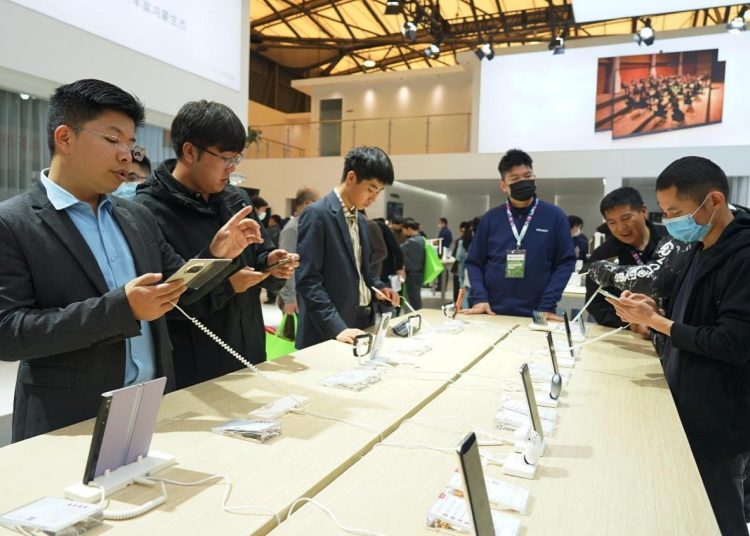By Li Jie
New products are an important engine driving China’s consumption growth today.
This year, a number of new products have been launched in various sectors of the consumption market, including Huawei’s P60 smartphone, the Blossoms Collection perfume of Jo Malone, collaboration T-shirts of UNIQLO, as well as new vehicle models by Chinese carmakers BYD, GAC Group and NIO.
Many consumers told People’s Daily that new arrivals account for a big portion of the products they purchase and can ignite their passion for consumption.
They said they would often follow the brands they like to see if these brands have launched new products, and they are always tempted by new functions, appearances and experiences.
According to statistics released by online marketplace Tmall under Chinese e-commerce giant Alibaba Group, every one in six Chinese online shoppers is buying newly released products today.
Last year, more than 50,000 newly released products on Tmall achieved a turnover of more than 1 million yuan ($139,975), which means that 136 one-million-yuan commodities were hitting the shelves every day on average. Besides, 500 brands generated over 100 million yuan in sales of new products, hitting a record high.
What’s behind these figures is the record-shattering speed of enterprises in launching new products in the Chinese market.
Panasonic sells in China nearly 3,000 home appliance models in tens of product lines under almost 30 categories. According to Tan Yuewen, head of the product marketing department of Panasonic Appliances (China) Co., Ltd., new products make up around 10 percent of major appliances for sale each year, while the figure is above 20 percent for small appliances.
China has the world’s largest and fastest-changing home appliance market with the fiercest competition, and with e-commerce, the market sees the highest demand for product updates, said Tan.
“Only by constantly speeding up R&D can we catch up with the changes in the Chinese market,” he noted.
According to statistics, product launches on Tmall jumped 137 percent year-on-year in 2022, and the figure exceeded 500 percent and 300 percent in the motorcycle equipment and ready-to-cook meal sectors, respectively. That in kids’ toys and pet supplies also doubled, making them the niche categories that have generated over 10 billion yuan in sales of new products.
General manager Mu Shan of Tmall’s marketing department told People’s Daily that new products play a significant role in promoting brand development and leading consumption trends, and are a major way to obtain new consumers and a key of enterprises to maintaining their profits.
Hot-selling new products and brands in China are also making their ways in the global market, such as floor washers and multifunctional pet supplies.
Executives of many enterprises told People’s Daily that apart from placing their production and manufacturing facilities in China, more and more enterprises are designing and developing their products in the country and then launching these products overseas.
This is attributed to the “assistance” from young consumers and e-commerce. Statistics indicate that Chinese young consumers have a strong purchasing power, and they value not only the quality and functions, but also the appearance of products, which creates new space for innovation.
E-commerce is the best “test field” for new products. Manufacturers can obtain product feedbacks on e-commerce platforms at the earliest possible, which makes possible digital insights, flexible supply chain and co-creation.
Last year, a special development team was established by American chocolate brand Dove and Tmall, which developed, in a very short period of time, two new products – black chocolate crisp and chocolate&cheese crisp. The black chocolate crisp became the hottest-selling item of Dove’s store on Tmall in just 10 days after its launch, and 76 percent of its buyers were new to the product.
“Our cooperation with Tmall shortened our R&D cycle by half, which enabled us to turn ideas into commodities in a more swift and targeted manner,” said Gao Haowei with Dove’s e-commerce sector.
In the fast-changing Chinese market, some enterprises are aiming at not only launching new products, but also developing a set of marketing methodology.
Gao told People’s Daily that many enterprises are making innovations according to this highly replicable method: leaning consumer demands, creating consumer portraits, building capability in co-creation, optimizing products and promoting them in the market.
Over recent years, executives of many enterprises in various industries have witnessed the high acceptability of Chinese consumers for innovative products.
They believe that China is growing into a source of consumer goods innovation of the world. In general, consumers are getting more rational and attaching more importance to health and the non-material features, and that’s what brands should target in the future, they said.













